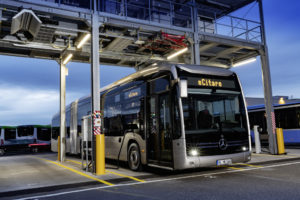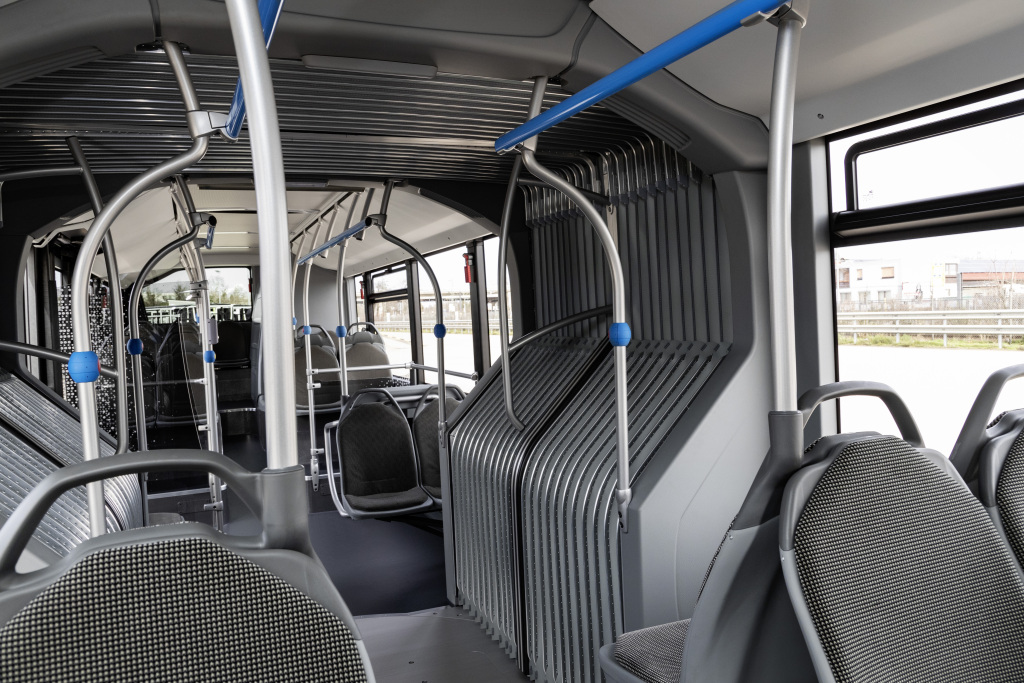Mercedes announces articulated electric bus
Mercedes-Benz has added an articulated version to its electric eCitaro bus range: the eCitaro G.
The manufacturer says the eCitaro G is the first bus in its category to be equipped with solid-state batteries. There are already definite orders for over 60 of the new articulated electric buses from half a dozen towns and cities. The first deliveries to several transport operators are planned for this year.
The new bus can carry up to 146 passengers, depending on the version.
Mercedes-Benz presented its original fully-electric driven solo regular service city bus, the eCitaro, two years ago. It is now in series production at the Mannheim plant, with hundreds in regular operation in many European towns and cities.
Till Oberwörder, Head of Daimler Buses, said: “I am really very pleased that our Mercedes-Benz eCitaro has established itself very well since its market launch. This shows that we are on the right track, offering products that our society wants and that our customers can work with. With the eCitaro as an articulated bus variant, we are consistently continuing the electrification of city buses: the eCitaro G will be equipped with innovative solid state batteries on request. In doing so, we are setting the course for sustainable and efficient passenger transport in urban centres.”
The articulated bus is ideal for operations in heavily-frequented towns and cities with large numbers of passengers and is an important factor for improving the quality of life in inner cities. The new eCitaro G combines the advantages of the well-proven Citaro G articulated bus with the extraordinary technology of the eCitaro and with revolutionary technologies for battery and electric drives.

Fully-electric Mercedes-Benz Citaro G articulated bus complements the electric range from Daimler Buses.
The eCitaro G is being launched with the NMC variant of lithium-ion batteries, currently fitted to the eCitaro solo bus. Mercedes-Benz expects to increase the performance of the eCitaro G this year by switching to a new generation of NMC batteries. This will increase capacity from 292 kWh to up to 396 kWh. The range of the articulated bus will be increased accordingly. Optionally available as a second possible technology for the new bus is solid-state batteries to store energy. These batteries are characterised by high energy density and a particularly long service-life. Chemically speaking these are lithium-polymer batteries. They are known as solid-state batteries because the usually liquid electrolyte is in solid form. Raw materials such as cobalt, nickel and manganese are not used for this type of battery. Equipped with seven battery packs, the eCitaro G achieves a total capacity of 441 kWh and thus guarantees ranges typical of city bus operations.
As the use of solid-state batteries is extremely restricted for fast, intermediate charging; solid state batteries cover other usage profiles than lithium-ion batteries (NMC). Mercedes-Benz deems them ideal for fast charging, whether during breaks between journeys at the depot or along the route. That is why the manufacturer is pursuing a two-fold strategy, offering the eCitaro G with both battery technologies.
Beyond the launch of this vehicle, from 2022 the range of the eCitaro and eCitaro G is planned to be increased with a fuel cell as a range extender. This technology is designed to eliminate the need for intermediate charging and the complex infrastructure required for it in almost all cases.

